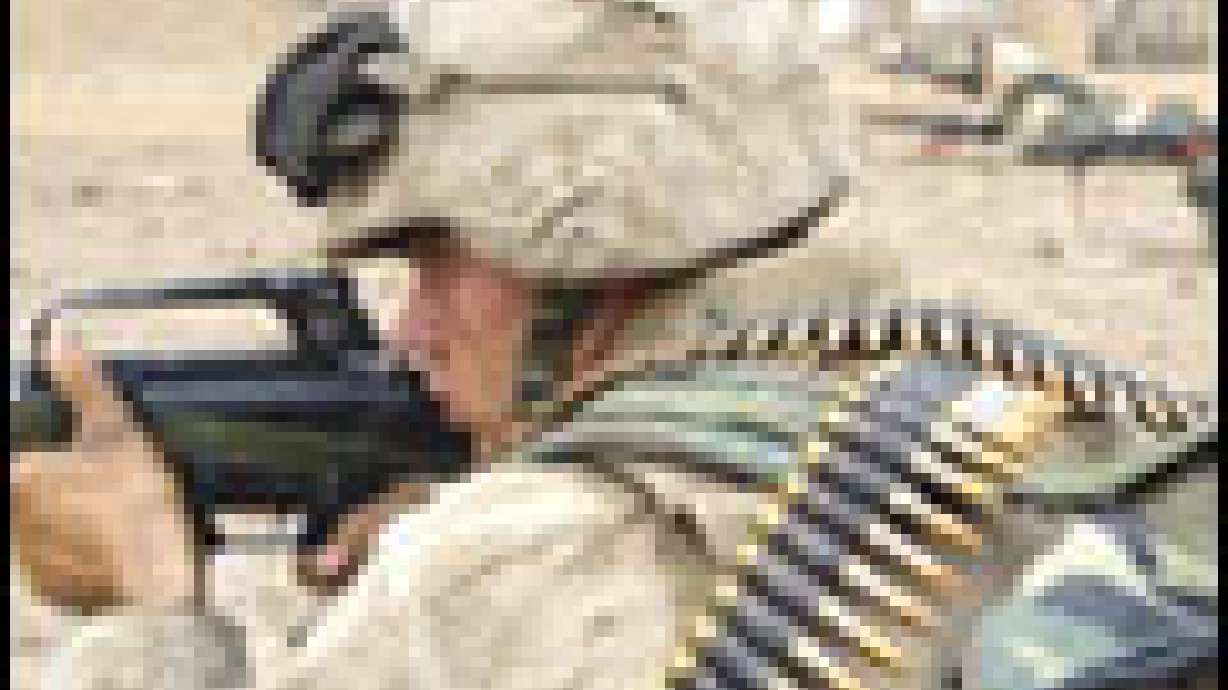Estimated read time: 4-5 minutes
This archived news story is available only for your personal, non-commercial use. Information in the story may be outdated or superseded by additional information. Reading or replaying the story in its archived form does not constitute a republication of the story.
BAGHDAD, Iraq (AP) -- American forces tightened their grip throughout Baghdad on Tuesday, crushing an Iraqi counterattack and seizing a military airport and a huge cache of weapons. Saddam Hussein's fate was uncertain after a fresh attempt to kill him from the air.
Inside the capital to stay, some Army units routed Iraqi fighters from a Republican Guard headquarters while others discovered a 12-room complex inside a cave, complete with white marble floors, 10-foot ceilings and fluorescent lighting.
Marines fighting their way into the city from the east seized the Rasheed Airport, captured enough ammunition for an estimated 3,000 troops, and took a prison where they found Army uniforms and chemical weapons suits, possibly belonging to U.S. POWs.
"We are continuing to maintain our ability to conduct operations around and in Baghdad, and remove them from regime control" said Capt. Frank Thorp, a spokesman at U.S. Central Command.
State-run Iraqi television was knocked off the air, temporarily at least, denying the regime a key source of influence over a population increasingly eager to help the forces of Operation Iraqi Freedom.
There were military losses for the Americans amid the gains.
An A-10 "Warthog" warplane was shot down near Baghdad early in the day, believed to be the first fixed-wing aircraft downed by an Iraqi surface-to-air missile since the war began. U.S. Central Command said the pilot ejected safely, was recovered by ground forces and was in good condition.
The toll on civilians from four days of urban combat was unknown. But the World Health Organization said Baghdad's hospitals were running out of supplies to treat the burns, shrapnel wounds and spinal injuries caused by the fighting.
Outside the capital, U.S. jets bombed Iraqi positions near the northern city of Kirkuk, which remained under control of the regime. In the southeastern city of Amarah, Marines seized the airport and an ammunition dump without resistance.
In Basra, a southern city of 1.3 million people under British control at last, military officials appointed a local sheik as a civilian commander, the first postwar administration put into place anywhere in the country.
Postwar government was a key topic for a summit meeting that brought President Bush and British Prime Minister Tony Blair to Northern Ireland. Both men talked of a U.N. role inside Iraq once the fighting is over, and sought to minimize splits on who should govern and rebuild the country.

In the meantime, they trumpeted the battlefield successes of the American and British forces, and said Saddam's days were numbered.
"I don't know whether he survived," a bombing attack on Monday, Bush said of the Iraqi leader. "The only thing I know is that he's losing power."
Iraq's ambassador to the United Nations said he believed Saddam had escaped the bombing of a site where he and at least one son were believed to have been meeting on Monday.
There was no direct evidence either way, though.
The site remained in Iraqi hands, although Brig. Gen. Vincent Brooks said American troops hoped to get there soon.
Officials ordered the attack after getting intelligence that Saddam was there, officials said, and four bunker-busting bombs were dropped by a single B-1B bomber.
The precision-guided 2,000-pound munitions left a smoking crater 60 feet deep in the upscale al-Mansour section of western Baghdad, destroying at least three houses and damaging 20 more. Rescue workers using a bulldozer they said they had recovered three bodies -- including that of a small boy -- and the death toll could reach 14.

The bombing marked the second time that Americans had targeted Saddam for death in the war. Bush personally approved a missile strike on March 19, the opening salvo of the military campaign to topple his regime.
Among the civilian casualties were journalists covering the war.
Two cameramen and one other journalist were killed and at least three others wounded when an American tank fired a round into the Palestine Hotel where they were staying. Commanders said hostile fire had been coming from the building.
Separately, the Arab television network al-Jazeera reported that a U.S. warplane attacked its office on the banks of the Tigris River, killing a reporter.
The counterattack began shortly after dawn when an estimated 500 Iraqis jumped off trucks and buses, firing assault rifles and rocket-propelled grenades at Army forces holding a key intersection in the western part of the city.
Two A-10 warplanes were called in to provide air cover, strafing building tops and directing 30 mm rapid cannon fire against the Iraqis. "They're a beautiful thing," said Capt. Philip Wolford, a company commander with the 3rd Infantry Division, as the jets roared overhead.
He said at least 50 Iraqis were killed in the attack, and the rest routed. Two U.S. soldiers were reported wounded, one seriously, by snipers on nearby rooftops.
"We survived the first night, and that's usually the most difficult one," said Lt. Col. David Perkins, commander of the 3rd Infantry Division's 2nd Brigade, which spent Monday night on the grounds of the opulent New Presidential Palace.
Four days after Americans first penetrated the Baghdad outskirts, the city showed the effects of the war. Civilians roamed the streets with Kalashnikov rifles in hand, uncollected garbage piled up, and there were long lines at the reduced number of gasoline stations still open.
(Copyright 2003 by The Associated Press. All Rights Reserved.)









